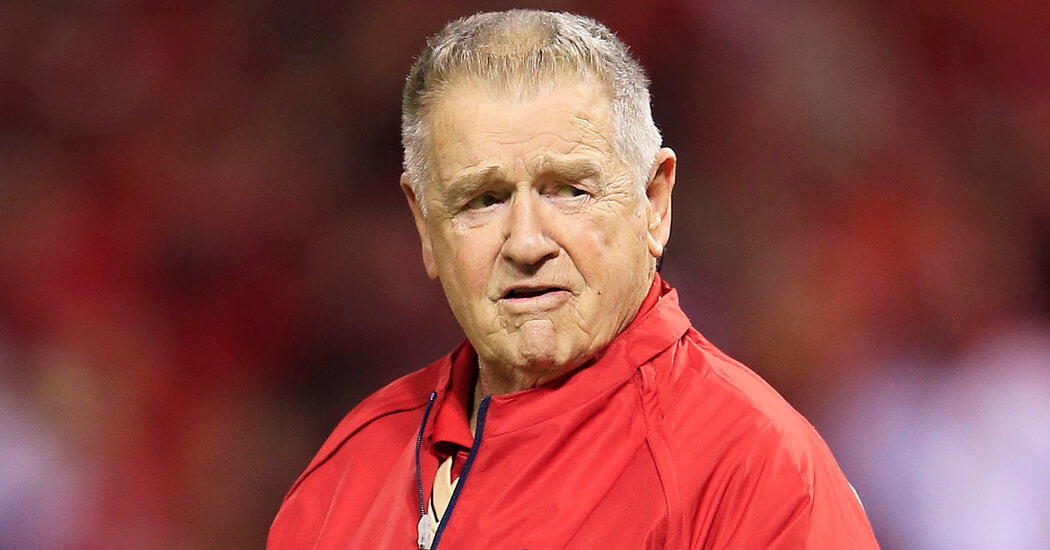[ad_1]
Whitey Herzog, the Hall of Fame manager who led the St. Louis Cardinals to three pennants and a World Series championship in the 1980s, died on Monday in St. Louis. He was 92 and had been the second-oldest Hall of Famer after Willie Mays.
His death was announced by the Cardinals.
“Baseball has been good to me since I quit trying to play it,” Herzog liked to say.
Signed by the Yankees in 1949, he never made it out of their minor league system, though he picked up a lifetime of baseball knowledge from Manager Casey Stengel at spring training camps. He played the outfield for four American League teams over eight seasons with only modest success.
But Herzog found his niche as a manager with what came to be called Whiteyball, molding teams with speed, defense and pitching to take advantage of ballparks with fast artificial turf and spacious outfields, first at Royals Stadium in Kansas City and then at Busch Stadium in St. Louis.
Herzog managed the Kansas City Royals to three consecutive American League division championships in the 1970s, then took the Cardinals to the 1982 World Series title with a team he had built while general manager as well. And he managed the Cardinals to pennants in 1985 and 1987.
He was elected to the Baseball Hall of Fame by the Veterans Committee in 2009.
“The fundamental aspects of the game were some of the things he always highlighted,” the Cardinals’ Hall of Fame shortstop Ozzie Smith once said. “It simply came down to the way he prepared us to play the game.”
But for all his baseball savvy, Herzog looked beyond Whiteyball in developing a rapport with his players.
As Bruce Sutter, the Cardinal reliever and also a Hall of Famer, once told The St. Louis Post-Dispatch, “How many managers can you blow a game for and go out fishing with him the next morning?
Dorrel Norman Elvert Herzog was born on Nov. 9, 1931, in New Athens, Ill., about 30 miles southeast of St. Louis, to Edgar and Lietta Herzog. His father was a brewery worker. (The nickname Whitey came from his light blond hair.)
As a boy, Whitey sometimes cut school to visit Sportsman’s Park in St. Louis and watch the Yankees play the St. Louis Browns (the team later became the Baltimore Orioles).
Herzog was signed by the Yankees out of high school, but they gave up on him after a long apprenticeship in the minors and traded him to the Washington Senators in 1956. He also played for the Kansas City Athletics, the Orioles and the Detroit Tigers. He appeared in 634 major league games with a career batting average of .257.
After two seasons with the Athletics, as a scout and then a coach, Herzog joined the Mets as their third-base coach in 1966, scouted for them in 1967, then spent five years overseeing their farm system.
Herzog was named manager of the Texas Rangers in 1973, taking over a young ball club, but was fired in early September with the team in last place in the American League West. He became a coach for the California Angels in 1974, filling in for four games as interim manager during a managerial change.
He replaced Jack McKeon as the Royals’ manager in the middle of the 1975 season, then led them to A.L. West titles the following three seasons, losing to the Yankees each time in the League Championship Series.
He regarded his 1977 team as the best he ever managed. It finished the regular season at 102-60, featuring speedy players like Fred Patek, Frank White and Amos Otis, the hitting of George Brett and the pitching of Dennis Leonard.
Herzog was fired after the Royals finished second in their division in 1979 and was named the Cardinals’ manager in June 1980. He was given the general manager’s job as well in late August, when he turned the managing over to Red Schoendienst.
He reclaimed the managing job in 1981, remaining as general manager until early in the 1982 season, when the team he had assembled in a flurry of deals went on to capture the Cardinals’ first pennant since 1968.
That ball club, featuring Smith at shortstop, Keith Hernandez at first base, Willie McGee, Lonnie Smith and George Hendrick in the outfield, Darrell Porter at catcher and the relief pitching of Sutter, went on to defeat the Milwaukee Brewers in a seven-game World Series.
After managing the Cardinals to two more pennants, Herzog resigned on July 6, 1990, when his team was in last place in the National League East. He worked after that as an executive with the Angels.
He is survived by his wife of 71 years, Mary Lou Herzog; their three children; Debra, David and Jim; nine grandchildren; and 10 great-grandchildren, the Cardinals said.
Herzog never forgot his baseball roots, most notably the wisdom imparted by Stengel when Herzog was a Yankee hopeful.
“Casey broke it down into the hundred little things that would make the difference,” Herzog recalled in “You’re Missin’ a Great Game,” written with Jonathan Pitts. “Once I began coaching and managing, I kept passing them along to my own players, to everybody from the youngest rookie-league bushwhackers to the George Bretts, Ozzie Smiths and Vince Colemans of the world. In Casey, I had an Einstein.”
Stengel could discourse on every facet of baseball, but Herzog recalled how one piece of advice Stengel imparted had nothing to do with strategy.
As Herzog once related it to The New York Times, “Casey told me, ‘Let ’em ask you one question and you keep talking so they won’t ask you another one.’”
Victor Mather contributed reporting.
[ad_2]
Source link
